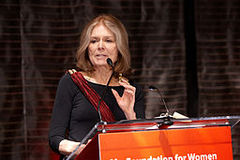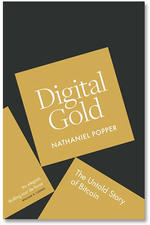The power of us
-thumb-340x175-176.png) In her new memoir, Life on the Road, the long-serving equity feminist and campaigner Gloria Steinem writes that decades of campaigning have taught her that, "Voting isn't the most we can do, but it is the least. To have a democracy, you have to want one."
In her new memoir, Life on the Road, the long-serving equity feminist and campaigner Gloria Steinem writes that decades of campaigning have taught her that, "Voting isn't the most we can do, but it is the least. To have a democracy, you have to want one."
Something similar could be said about privacy. Steinem never directly discusses it, but her many stories of collaborating with and listening to other people could provide lessons to any campaigner in any field. "Divide and conquer" works as well now as ever. That being the case, we might do better at achieving change if we define privacy less as individuals' boundaries and more as a collaborative social compact.
 This came into focus for me because I was in the middle of Steinem's book when I saw The Power of Privacy, produced by Guardian, in conjunction with Silent Circle. Part of a series, the short film provides a quick introduction to the basics: data collection, hacking, surveillance, encryption, and future challenges such as the Internet of Things. It ends with an invocation that we should be more responsible about privacy and less...inert.
This came into focus for me because I was in the middle of Steinem's book when I saw The Power of Privacy, produced by Guardian, in conjunction with Silent Circle. Part of a series, the short film provides a quick introduction to the basics: data collection, hacking, surveillance, encryption, and future challenges such as the Internet of Things. It ends with an invocation that we should be more responsible about privacy and less...inert.
The problem is that the movie neither provides ideas for what "more responsible" would look like nor drives home why it matters. I know it's a short film, but like much privacy material it assumes that people will be creeped out just by seeing all the personal information about them that's being hacked into, collected, and ransacked by unknown strangers with uncertain motives.
"Sometimes you have to sacrifice a little convenience for safety," a hacker at Defcon advises presenter Aleks Krotowski, who has just been sufficiently willing to look stupid in public that she has unquestioningly inserted the USB stick he's handed her into her laptop's port. OK: don't take USB sticks from smiling strangers. Anything else?
The reality is, it's no longer sufficient to rely on the "yuck" factor. Today's world is a far more safety-conscious, closely monitored, and publicly shared environment than anyone over 30 grew up in. That doesn't mean younger people are all brainwashed , but "normal" has significantly altered. We see that Krotowski's computer has been hacked, and we see the reputation detective's phone book of data about her - but we don't see consequences accrue. What exactly is the harm?
This question matters because people do ask it, and we - privacy advocates - have to have some meaningful response ready for those who say, "I have nothing to hide", "They already know everything about me anyway", and "So? They just want to sell us stuff". To the first, bank statements have long provided a reasonable answer.  Financial disclosure seems to be where everyone in most cultures draws the line. Even so, Malkia Cyril's response to that at last year's CFP seems much more true: "Everyone has something to hide because we all have lives".
Financial disclosure seems to be where everyone in most cultures draws the line. Even so, Malkia Cyril's response to that at last year's CFP seems much more true: "Everyone has something to hide because we all have lives".
Steinem also makes me dubious about another frequently heard claim, which also appears in the Guardian's movie. Privacy, Krotowski explains, was non-existent before the 1600s, when the chimney enabled people to live in their own homes instead of communally. This conflates privacy with physical space, isolation, and anonymity, not with mental freedom, tolerance for differences, or simply being beneficially ignored some of the time. The Japanese may lack a word for privacy, but they are masters of tacitly agreeing to block each other out. See also Manhattan subway cars, where the person plastered against you nonetheless maintains psychic distance by not speaking or meeting your eyes. I bet in those medieval villages, and even in the teepee-covered holes in the ground that I was told housed Native Alaskans for thousands of years, people found ways to create that same distance. As I said in 2008 of the movie Erasing David, privacy is about lack of fear, not isolation.
The second response is easily read as apathy or cynicism, but it's as reasonably a symptom of disempowerment (MP3): people who believe they have no ability to effect change figure they might as well lie back and think of England. Give them alternatives or usable tools that allow people to make genuine choices and then we'll see.
But it's the third question, which is really "where's the harm?". that's the hardest. We habitually invoke Orwell, the Nazis, and the Stasi, but these are all fading into the historical past. We need, as Steve Song wrote a couple of years ago, new metaphors.
Two possibilities that Song discusses are public health and environmental pollution. In both cases, as with privacy, each individual's decision has a wider social impact: your decision not to vaccinate your child may leave a vulnerable neighbor open to illness; my decision to operate a wood-burning stove forces you to breathe the resulting particulates and smoke. I like the public health one especially because you can enhance the analogy by imagining global air travel as the broadband that makes it scale.
I would never want to say that feminism or matriarchy has all the answers. But reading Steinem has made me consider that perhaps all those early 1990s gun metaphors (particularly about encryption) and rights-of-the-individual were a rhetorical wrong turn. It was easy to do, since we were responding to controls that saw these technologies as military weapons in the first place. Maybe instead of telling people about privacy we should be asking what it means to them. People will fight for the privacy they want.
Wendy M. Grossman is the 2013 winner of the Enigma Award. Her Web site has an extensive archive of her books, articles, and music, and an archive of earlier columns in this series. Stories about the border wars between cyberspace and real life are posted occasionally during the week at the net.wars Pinboard - or follow on Twitter.
-thumb-340x255-165.jpg)

-thumb-200x150-171.jpg)
 In an example of the kind of news we can expect from the Internet of Things, Google apparently
In an example of the kind of news we can expect from the Internet of Things, Google apparently 

 the University of Pennsylvania professor
the University of Pennsylvania professor 
